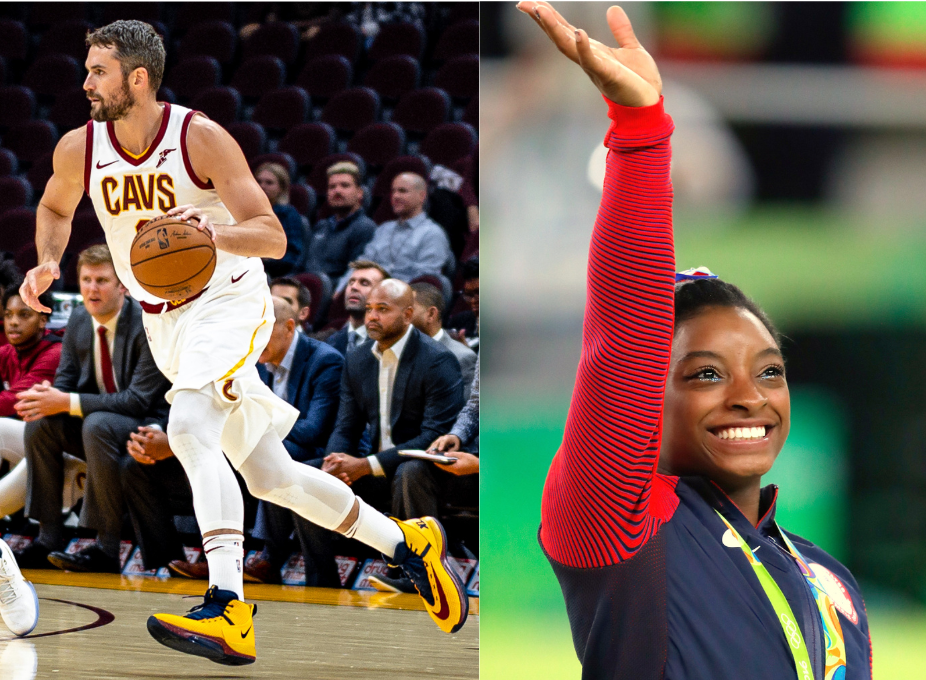When we think of big-name athletes, we think of their incredible, high-flying performances. With a professional athlete’s money, fame and status, it can be assumed that their lives must be nearly perfect. However, it is easy to forget that even athletes on the biggest of stages are humans like you who deal with the same struggles. Two athletes in particular, NBA All-Star Kevin Love and legendary gymnast Simone Biles, are two examples of stories when athletes were willing to show their vulnerability and humanity, using their platforms to speak out about the importance of mental health.
In 2018, Kevin Love spoke about something that occurred to him during a game. , He suffered a panic attack while playing. In an article for “The Players Tribune,” Love described how he ran off the court into the locker room and expressed his feelings as if his body told him, “You’re about to die.”
Love ultimately was checked out by team doctors and was determined to be physically okay. In the aftermath of his panic attack, Love was relieved that no one had found out why he had left the game.
Love eventually chose to talk to a therapist which helped him immensely. Since the panic attack incident, Love has become a public advocate for mental health. He felt that it was essential to share his story to help erase the stigma around discussing mental health, especially for men and boys, who may feel more societal pressure to keep their problems inside. He felt he had to “be a man” and keep his emotions inside when he was younger. He now emphasizes, “No matter what our circumstances, we’re all carrying around things that hurt and they can hurt us if we keep them buried inside.” Love has received recognition for speaking about his mental health struggles, receiving the Arthur Ashe Courage Award at the ESPY Awards 2020.
Kevin Love is not the only athlete who turned something that happened to them into an opportunity to advocate for talking about mental health. At the 2021 Olympics in Tokyo, Simone Biles wanted to continue her dominance in all of the gymnastics events. But, when she went up to perform on the vault, she lost her bearings in the air and landed awkwardly on the ground. It was clear that something wasn’t right.
She then stunned the world by announcing that she would pull out of the all-around team finals to focus on her mental health. Biles explained that she was suffering from the “twisties,” a mental block that a gymnast can experience in the air. It is as if the gymnast’s mind wants to do something, but the body simply won’t do it. This can be extremely dangerous for gymnasts trying to land after rotating their bodies and could lead to serious injury. It also takes a mental toll on the athlete, with Biles saying, “Taking something that I’ve done forever and just not being able to do it because of everything I’ve been through is crazy.” Biles also spoke about being a survivor of sexual abuse, which she said affected her during the Olympics.
Despite pulling out of the events, Biles continued to cheer on her teammates and returned at the end of the Games to win a bronze medal on the balance beam. Like Love, Biles received massive praise for her decision, with Taylor Swift calling Biles’ “honesty as beautiful as the perfection that has long been her signature”. Biles has also continued to advocate for mental health by partnering with the app Cerebral which offers virtual therapy and mental health solutions.
The honesty and humanity shown by Love and Biles can help them be role models to younger athletes and show them that it is acceptable to talk about mental health.
When asked to share their perspective on what pro athletes speaking out meant to them, JCU student-athletes found inspiration in their words. Gabby Hougan‘25, who plays softball at John Carroll, said, “Seeing people like them speak about and prioritize their mental health is huge for young athletes, too. If people like Simone Biles were talking about mental health when I was in high school, I would have been so much more prepared for college athletics and its impact on my well-being.”
Football player, Jeremy Bravard ‘24, said, “Seeing Kevin Love work to erase the stigma around men’s mental health is encouraging to see and it helped me focus on my well-being.”
The perspective of a student-athlete shows that Kevin Love and Simone Biles speaking out helps not only themselves but also the next generation of athletes.


